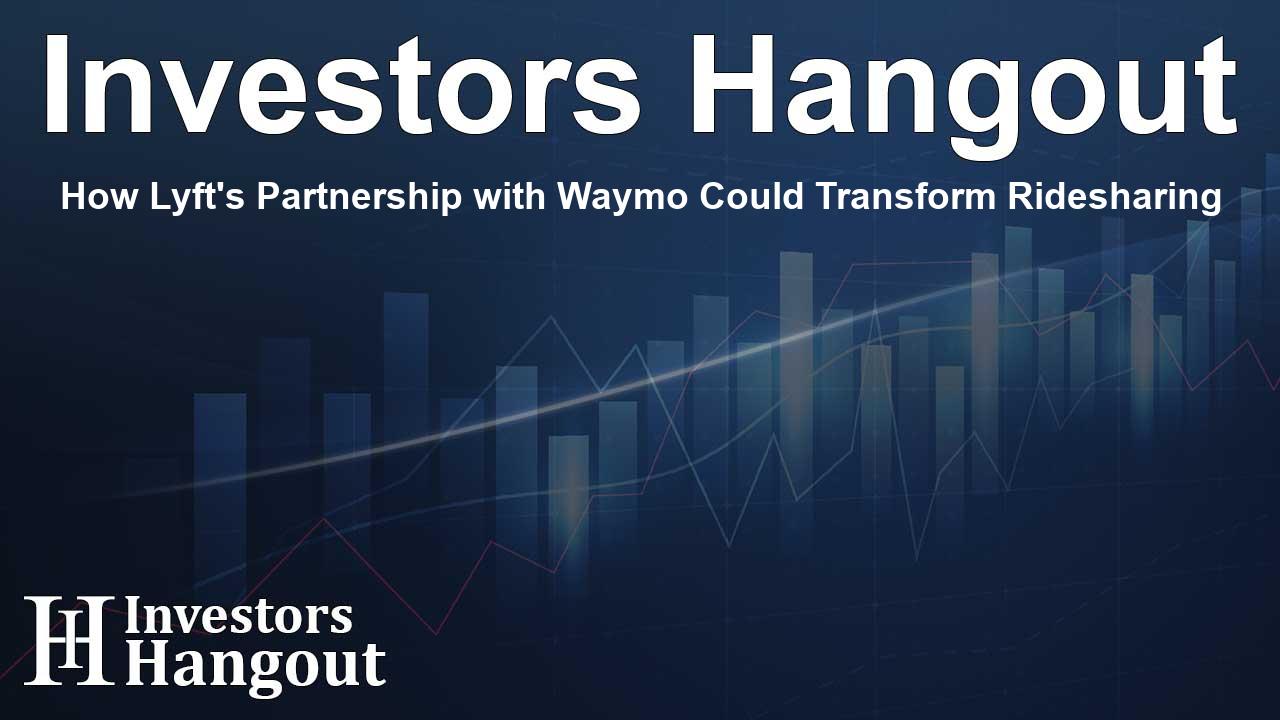How Lyft's Partnership with Waymo Could Transform Ridesharing

Lyft and Waymo: A Game-Changing Alliance
Lyft is making waves in the autonomous vehicle realm with its groundbreaking partnership with Alphabet's Waymo. This strategic alliance aims to carve out sustainable and profitable options in the ride-hailing industry, primed to challenge Uber’s established position. The goal? To integrate advanced technology while ensuring a positive financial outcome from the outset.
Analytical Insights on Lyft's Partnership
Market analysts are taking notice. Benchmark’s Daniel L. Kurnos has expressed unwavering confidence in Lyft's future, reaffirming his “Buy” rating for the stock. Kurnos recently elevated his price target from $20 to $26, citing this partnership as a pivotal moment for Lyft within both the rideshare and autonomous vehicle arenas.
Disrupting the Market Dynamics
Kurnos pointed out that this partnership signifies the end of Uber's perceived dominance. It positions Lyft prominently in conversations around autonomous vehicles, thereby enhancing its credibility in a rapidly evolving market. This move aligns seamlessly with Kurnos’ earlier predictions when he upgraded Lyft's stock earlier in the year.
Analyzing Key Elements of the Deal
The analyst emphasized three vital points regarding the Waymo collaboration. First, Lyft anticipates immediate profitability per ride, buoyed by innovations in fleet management, along with the introduction of Flexdrive. This unique aspect of the partnership is expected to be favorable for margins in a competitive marketplace.
Exploring Technological Advantages
Secondly, Lyft is entering into a domain where Waymo already leads. They plan to leverage an advanced supply algorithm to maximize utilization rates effectively. This mutually beneficial strategy allows both companies to optimize their operational efficiency and better serve riders with heightened responsiveness.
Financial Projections and Investment Plans
Despite needing to invest between $10 to $15 million for the necessary infrastructure, Lyft expects a swift return on this investment. Kurnos outlined that this partnership is distinct from previous public collaborations and will attract considerable attention from industry observers.
Navigating Legislative Challenges and Opportunities
As regulations evolve, significant changes may offer financial relief. For example, potential legislation in California has the potential to drastically reduce Lyft’s insurance expenses, potentially saving the company hundreds of millions. However, CEO David Risher cautioned against overreliance on this potential cost cut, noting it might be a rough estimate.
Shaping Market Strategy
Lyft aims to translate any savings directly into reduced fares for its customers, cultivating greater demand and enhancing user experience. Kurnos pointed out that Lyft currently incurs about $6 per ride in insurance costs in California, a figure that could decrease as regulations adapt.
Understanding Market Expectations
Kurnos has scrutinized industry expectations, suggesting that Wall Street may overestimate Lyft's revenues while undervaluing emerging opportunities from Lyft Media platforms and renewed insurance collaborations. He projects that by 2027, Lyft will achieve approximately $24 billion in gross bookings and around $900 million in EBITDA, closely aligning with market forecasts.
Media Strategies and Growth Potential
Specifically, Kurnos anticipates that Lyft Media could surpass its estimated contribution of $265 million, accelerating the growth path towards Lyft’s ambitious $1 billion EBITDA target. Despite the hurdles that lie ahead, Kurnos believes that Lyft has not only met, but exceeded expectations, making it one of his top investment picks.
Future Growth Expectations
Looking ahead to the fiscal year 2025, Kurnos estimates Lyft's revenue will reach $6.37 billion, alongside an adjusted earnings per share of $1.18, marking significant strides in its financial performance.
Stock Performance Update
As it stands, LYFT stock has seen a slight increase, trading 0.05% higher at $22.59. This uptick is reflective of market confidence following recent announcements about the Waymo partnership and its anticipated impact on Lyft’s trajectory.
Frequently Asked Questions
What does Lyft’s partnership with Waymo entail?
Lyft's partnership with Waymo focuses on integrating autonomous vehicle technology into its ride-hailing services to enhance profitability and efficiency.
How has the market reacted to this collaboration?
Analysts have reacted positively, with raised price targets reflecting increased confidence in Lyft's future growth potential and position in the market.
What are the expected financial impacts of this deal for Lyft?
The partnership is projected to yield profitability from the outset, with significant potential savings on insurance expected to further strengthen financial performance.
How does this partnership affect Uber's market position?
This collaboration challenges Uber's dominance by enhancing Lyft’s credibility and ability to compete in the autonomous space.
What are Lyft’s future revenue projections?
Kurnos projects Lyft will generate approximately $24 billion in gross bookings and $900 million in EBITDA by 2027, indicating strong growth opportunities.
About The Author
Contact Ryan Hughes privately here. Or send an email with ATTN: Ryan Hughes as the subject to contact@investorshangout.com.
About Investors Hangout
Investors Hangout is a leading online stock forum for financial discussion and learning, offering a wide range of free tools and resources. It draws in traders of all levels, who exchange market knowledge, investigate trading tactics, and keep an eye on industry developments in real time. Featuring financial articles, stock message boards, quotes, charts, company profiles, and live news updates. Through cooperative learning and a wealth of informational resources, it helps users from novices creating their first portfolios to experts honing their techniques. Join Investors Hangout today: https://investorshangout.com/
The content of this article is based on factual, publicly available information and does not represent legal, financial, or investment advice. Investors Hangout does not offer financial advice, and the author is not a licensed financial advisor. Consult a qualified advisor before making any financial or investment decisions based on this article. This article should not be considered advice to purchase, sell, or hold any securities or other investments. If any of the material provided here is inaccurate, please contact us for corrections.
